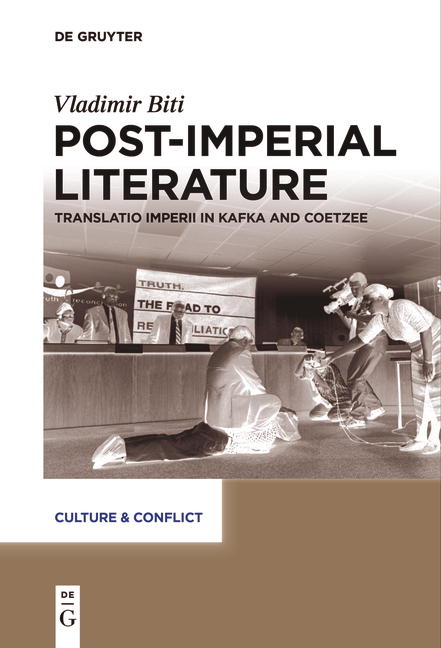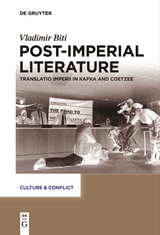Post-imperial Literature
Translatio Imperii in Kafka and Coetzee
Seiten
2021
De Gruyter (Verlag)
978-3-11-073728-8 (ISBN)
De Gruyter (Verlag)
978-3-11-073728-8 (ISBN)
The series Culture and Conflict aims to promote a dynamic, pluridisciplinary dialogue meant to discuss the multiple ways in which conflict influences, supports or constrains the production of meaning in modernity. It publishes innovative original scholarship from the fields of literary and cultural studies as well as media, visual and film studies. Culture and conflict inevitably go together. The very idea of culture is marked by the notion of difference and creative, i.e., conflictual interaction. Differential markers, such as self and other, inside and outside, high and low, pure and dirty, old and new, support the key themes of the study of culture, e.g., identity and diversity, memory and trauma, translation of cultures and globalization, mediation and exclusion. The new series Culture and Conflict aims to promote a dynamic, pluridisciplinary dialogue meant to discuss the multiple ways in which conflict influences, supports or constrains the production of meaning in modernity. It publishes innovative original scholarship from the fields of literary and cultural studies as well as media, visual and film studies.
This book proposes a new departure point for the investigation of transnational literary alliances: the traumatic constellation of translatio imperii, which followed the dissolution of the East-Central European empires in the 1920s and the crumbling of the West European colonial empires in the 1950s. To prevent their breakdown, the former transitioned from a ‘sovereign’ to a ‘disciplinary’ mode of administration of their peripheries, the latter from the merciless assimilation of their colonial constituencies to their affirmative regeneration. This book treats Franz Kafka as the writer of the first transition, prefiguring J. M. Coetzee as the writer of the second. In a series of close readings, it investigates the particular ways in which the restructuring of power relations between the agencies in their fictions is a response to the delineated post-imperial reconfiguration of the new countries’ governmental techniques. By displacing their narrative authority beyond the reach of their readers, they laid bare the sudden withdrawal of transcendental guarantees from the world of human commonality. This entailed an unstable and elusive configuration of their fictional worlds as a key feature of post-imperial literature.
This book proposes a new departure point for the investigation of transnational literary alliances: the traumatic constellation of translatio imperii, which followed the dissolution of the East-Central European empires in the 1920s and the crumbling of the West European colonial empires in the 1950s. To prevent their breakdown, the former transitioned from a ‘sovereign’ to a ‘disciplinary’ mode of administration of their peripheries, the latter from the merciless assimilation of their colonial constituencies to their affirmative regeneration. This book treats Franz Kafka as the writer of the first transition, prefiguring J. M. Coetzee as the writer of the second. In a series of close readings, it investigates the particular ways in which the restructuring of power relations between the agencies in their fictions is a response to the delineated post-imperial reconfiguration of the new countries’ governmental techniques. By displacing their narrative authority beyond the reach of their readers, they laid bare the sudden withdrawal of transcendental guarantees from the world of human commonality. This entailed an unstable and elusive configuration of their fictional worlds as a key feature of post-imperial literature.
lt;strong>Vladimir Biti, University of Vienna, Vienna, Austria.
| Erscheinungsdatum | 27.10.2021 |
|---|---|
| Reihe/Serie | Culture & Conflict ; 20 |
| Verlagsort | Berlin/Boston |
| Sprache | englisch |
| Maße | 155 x 230 mm |
| Gewicht | 530 g |
| Themenwelt | Geschichte ► Teilgebiete der Geschichte ► Kulturgeschichte |
| Geisteswissenschaften ► Sprach- / Literaturwissenschaft ► Literaturwissenschaft | |
| Schlagworte | deterritorialization • narrative authority • narrative authority, deterritorialization • self-exemption • Translatio Imperii |
| ISBN-10 | 3-11-073728-0 / 3110737280 |
| ISBN-13 | 978-3-11-073728-8 / 9783110737288 |
| Zustand | Neuware |
| Informationen gemäß Produktsicherheitsverordnung (GPSR) | |
| Haben Sie eine Frage zum Produkt? |
Mehr entdecken
aus dem Bereich
aus dem Bereich
der stille Abschied vom bäuerlichen Leben in Deutschland
Buch | Hardcover (2023)
C.H.Beck (Verlag)
23,00 €
vom Mittelalter bis zur Gegenwart
Buch | Softcover (2024)
C.H.Beck (Verlag)
12,00 €




